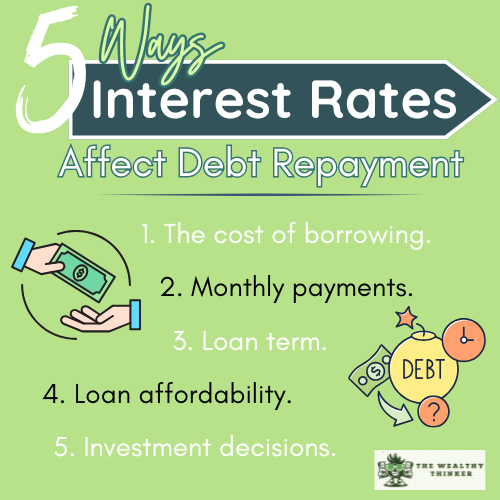When it comes to managing debt, interest rates are more than just a number – they’re the key to understanding the real cost of borrowing.
These rates determine how much you’ll pay back over time, influencing your:
- monthly payments
- total repayment amount
- pace at which you can eliminate debt
For anyone working to pay off loans or credit card balances, understanding how interest rates impact your financial journey is essential.
More importantly, knowing how to lower those rates can mean the difference between years of financial stress and achieving freedom sooner than you thought possible.
In this article, we’ll explore the ins and outs of interest rates:
- what they are
- how they shape your debt repayment
- the actionable steps you can take to make the best financial choices

What is an interest rate?
The interest rate is how much a lender charges a borrower.
It is expressed as a fraction of the principal, which is the amount borrowed.
For example if you borrow $10,000 and the lender charges you 5%, this means the interest rate you would pay on the $10,000 loan is $500.
The interest rate on a loan is usually shown once a year which is called the Annual Percentage Rate (APR).
They can be:
- fixed (stay the same for the entire loan term)
- variable (change over time)
Is interest rate the same as cost of debt?
Interest rate and the cost of debt are related but not the same thing.
Interest rate is the cost you pay for borrowing money. It is the percentage at which a lender charges interest on a loan or debt.
Cost of debt on the other hand, is the total expense incurred by borrowing money.
It includes not only the interest, but also any fees, initial costs, and other costs that came up when the loan was taken out and paid back.
In other words, the cost of debt is a more general way to figure out how much it costs to borrow money.
Take the case of a personal loan with a 6% interest rate and a 1% transaction fee.
The total cost of your debt is 7%, which is made up of 6% interest and 1% fee.
It’s important to look at both the interest rate and any other costs or fees that come with a loan or debt when deciding if it’s affordable.
This will help you get a better idea of how much you’ll pay in the end.
7 Ways Interest Rates Affect Debt Repayment
Interest rate affects your ability to repay debt in various ways. Let’s have a look at some of them.
1. Cost of borrowing.
The interest rate is an indicator of how much borrowing money from a lender will cost.
Over the course of the loan, borrowers will pay more in interest due to higher interest rates.
2. Monthly payments.
The amount of monthly loan or debt payments is greatly influenced by interest rates.
Monthly payments are less expensive when interest rates are low. On the other hand, higher interest rates mean bigger monthly payments.
3. Loan term.
Interest rates can affect the length of the loan term.
With higher rates, borrowers might choose longer loan terms to reduce monthly payments. Lower rates may allow for shorter loan terms with quicker debt repayment.
4. Affordability.
Borrowers may find it more difficult to afford debt due to high interest rates, which could result in missing payments or default.
Interest rates that are low encourage timely repayment of debt and make it easier to manage.
5. Investment decisions.
When choosing whether to invest or use additional money to pay off debt, borrowers should also take interest rates into account.
It may be more financially advantageous to invest than to pay off debt quickly if investments may yield a better return than the interest rate on the debt.
Let’s look at 2 examples of how this could play out. Say you have $1,000 you want to use to either pay down your debt or add to your savings as an extra investment.
Option #1: Paying down debt.
Let’s say you have an auto loan debt of $10,000. Your monthly payments are $519 at 4.9%. This set up will take you 21 months to pay off, with a total interest of $436.67.
At 6 months in, you put down your extra $1,000 towards your debt.
This will drop your time frame to pay off your loan to 19 months and your total interest will be $379.70.
Result: That’s a savings of about $57 in interest, plus you pay off your loan 2 months sooner.
Option #2: Adding to your savings.
Now, say you have a high-yield interest savings account with a $5,000 balance, and an interest rate of 4%.
If you don’t add anything extra to it and the interest rate stays the same, your balance would be $6,083.26 over 5 years, with $1,083.26 from interest.
If you add that extra $1,000 to your savings account in Year 2 and never touch it, now you’ll have $7,208.13 – $1,208.13 of which came from interest earned.
Result: That $1,000 would give you an extra $124.87 in interest over the 5 years.
Now, you can decide what’s more valuable to you within your financial goals and plans.
6. Credit card debt.
Interest rates on credit cards are especially important.
High interest rates on credit cards can create a vicious cycle of debt accumulation that makes it difficult to pay off the principal amount.
7. Credit scores.
Interest rates offered to borrowers can depend on their credit scores.
Higher credit scores often qualify for lower interest rates, making debt more affordable for responsible borrowers.
9 Steps to Lower Your Debt Interest Rates
Lowering the interest rates on your debt can save you money and make it easier to pay off what you owe.
Here are several strategies you can use to reduce your interest rates:
1. Improve your credit score.
Credit scores help lenders figure out how risky a borrower is. Most of the time, you can get lower interest rates if your credit score is good.
To improve your credit score you should:
- pay monthly balance on time.
- reduce credit card balances.
- avoid opening new credit accounts frequently.
- check your credit report for errors and dispute any inaccuracies.
Raise Your Credit Score: 6 Key Questions If You Need a Boost
2. Renegotiate with your loan.
Get in touch with your lenders and ask if they can lower your interest rate.
Be polite and explain your position. For example, say you’re having trouble with money or have a history of paying your bills on time. Creditors might lower your rate if they want to keep your business.
Our Top Tips to Negotiate a Lower Interest Rate With Your Creditors
3. Transfer balances.
If you have high-interest credit card debt, you could choose to move the balance to a credit card that has a promotional interest rate that is lower.
Seek out cards that offer introductory rates of 0% APR. Pay off the remaining amount before the promotional period expires, and be mindful of balance transfer costs.
Balance Transfer Cards: Should You Consider Getting One?
4. Consolidate your debt.
Consolidating debt means taking out a new loan with a lower interest rate in order to pay off many loans with high interest rates.
Personal loans, home equity loans, and credit lines are common choices. Payments can be made easier with consolidation, and it may even result in lower interest rates.
5. Refinancing.
You can consider refinancing your high-interest loans—such as student or personal loans—at a lower interest rate if you have any. For those who own a home, refinancing their mortgage may also be an option.
6. Seek a co-signer.
Having a co-signer with good credit can help you qualify for loans or credit cards with cheaper interest rates if your credit isn’t that great.
Recognize that your co-signer bears equal liability for the debt.
7. Pay on time.
Over time, interest rates may go down if you always make your payments on time.
Lenders may lower interest rates for people who have paid their loans on time in the past.
8. Financial counseling.
A nonprofit credit counselling organization may be able to assist you.
They can help you with:
- making a budget
- settling debts with creditors
- designing a strategy for managing your debt
9. Make extra payments.
Whenever you can, increase the amount you pay on your loans.
This lowers the interest you will pay over the course of the loan in addition to the principal sum.
Will a lower interest rate lower my monthly payment?
A lower interest rate lowers the cost of borrowing.
This in turn results in a lower monthly payment because interest is applied to the principle at a smaller percentage each month.
For instance, your monthly payment for a $10,000 personal loan with a 5% annual interest rate would be $856.07 if you took out the loan over a twelve-month period.
If the same amount and term were applied to an interest rate of 3%, your monthly payment would decrease to $846.94.
Though a reduced interest rate will shorten your monthly payment, it may also result in an extended repayment period or lower overall loan costs.
When evaluating how an interest rate change will affect your monthly budget, you should always take the loan’s total cost and term into account.
Final thoughts
In conclusion, interest rates are a critical component of repaying debt.
In order to control or lower interest expenses, borrowers should carefully analyze interest rates before taking on additional debt.
Some techniques to do this include refinancing or consolidating loans when rates are low.
Additionally, being aware of how interest rates affect finances can assist people in making wise choices regarding their investments and financial priorities.
Editor’s note: This article was originally published Oct 13, 2023 and has been updated to improve reader experience.
Photo by Joshua Hoehne on Unsplash



















